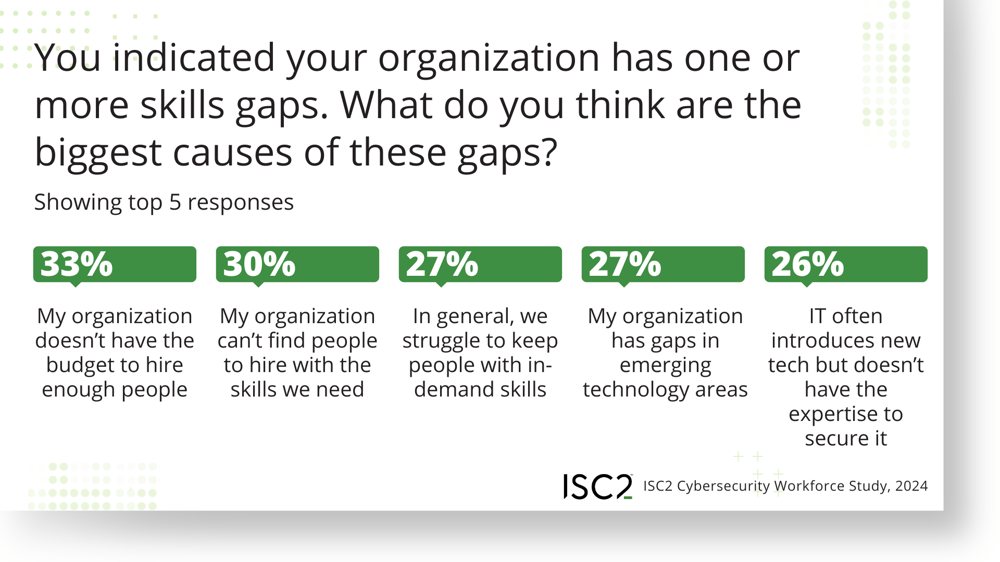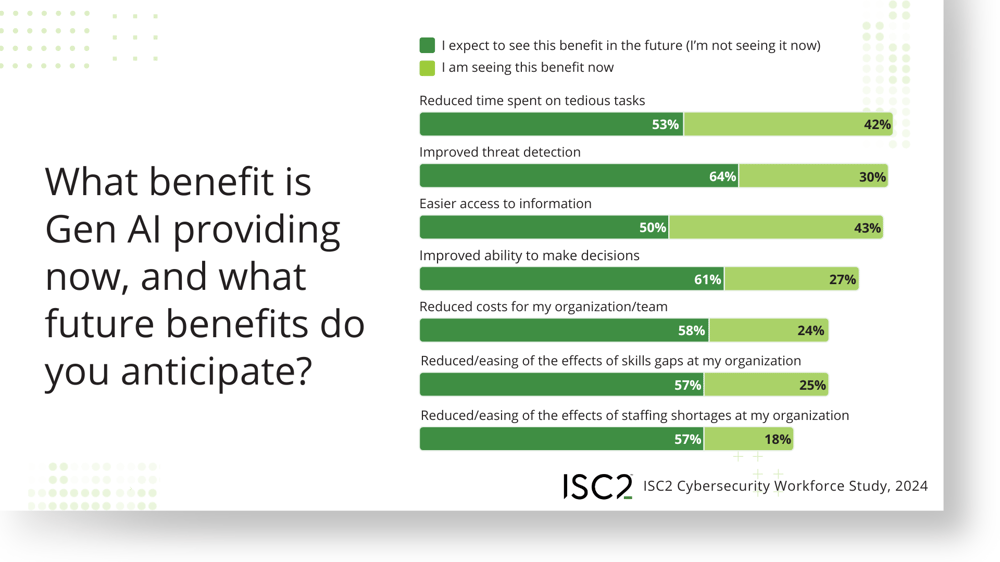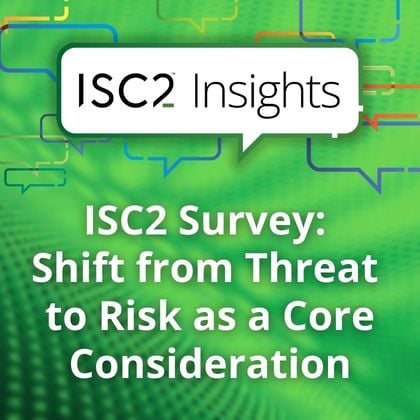The ISC2 Cybersecurity Workforce Study delves deep into trends impacting the workforce – are they happy in their jobs, what do they need to learn to advance in their career, what threats are they most worried about and more. It offers a wealth of insights on the challenges and opportunities that cybersecurity professionals have seen so far this year, and anticipate in the future. But what we’re diving into today are the top insights that employers – those who hire or manage cybersecurity professionals – need to know to support their teams in an AI-driven workplace.
What Employers Need to Know about AI for Cybersecurity
Generative Artificial Intelligence (Gen AI) is a major theme of this year’s report, as it presents itself with the potential to be both hero and villain for cybersecurity teams. Over one-third of respondents cited AI as the biggest skills shortfall on their teams, indicating a strong need for better training on the topic. However, study participants are optimistic about AI adoption and are open to attaining the skills they need to be successful in an AI-driven workplace. 66% of study participants see AI representing career growth opportunities, and 54% said it will be helpful to their organizations’ security operations.
Already, 45% of cybersecurity teams have implemented Gen AI into their teams’ toolbox, and the security department is not alone, as 64% of respondent organizations have implemented Gen AI in other departments (creating even more work for cybersecurity teams).
While Gen AI use proliferates, 65% said their organization needs to implement more regulations on its safe use, but only 60% reported that their cybersecurity team is involved with creating those guidelines. The lack of a clear Gen AI strategy was cited as one of the top barriers to organizational adoption by nearly half (45%) of all participants.
Strengthen Your Team’s AI Security Skills
In 2024, ISC2 launched a series of in-person workshops focused around Securing AI. These 2-day workshops now offer a virtual option for attendance and are the ideal way to ensure your organization is using AI in a secure manner to optimize workflow while safeguarding your digital assets. Learn more here.
What Your Teams Think about AI in Cybersecurity
Cybersecurity professionals are confident Gen AI will not replace their roles. Only one-third of respondents are concerned about their role not being “future-proof” in a Gen AI world. The other two-thirds are confident that their expertise will complement the technology.
Beyond that, Gen AI is expected to bring both financial and technical benefits to cyber teams. A majority of survey respondents (68%) agree that within the next two years, they will be able to effectively use Gen AI as part of their role. Many anticipate Gen AI improving threat detection, as well as team members’ ability to make decisions and reduce costs for their organization.
Currently, cybersecurity professionals don’t feel that their organizations have enough staff to meet their goals, with two thirds (67%) indicating they had a workforce shortage this year. The cause for that shortage ranged from a lack of budget, to not being able to find the right talent, to managing turnover. See below.

Teams are feeling understaffed, as well as under pressure. 74% of respondents said the threat landscape is the most challenging they have experienced in the last five years. Cybersecurity job satisfaction has fallen from 74% in 2022 to 66% in 2024.
However, looking ahead to the next three years, cybersecurity professionals believe that Gen AI will help reduce the impact of both staffing shortages and skills gaps as shown below. This highlights the substantial potential of Gen AI to revolutionize the cybersecurity landscape and address critical industry challenges.

What Employers Need to Know about Cybersecurity Hiring in the Age of AI
With the proliferation of AI use, hiring managers reported that they are prioritizing transferable skills that will complement AI adoption. This means skills like problem-solving (31%) and curiosity (26%) are ranking higher than technical skills like cloud computing security (19%) or risk analysis (14%) when looking for new talent.
The anticipated advancements in AI will change the way cybersecurity professionals view their skills shortage, as AI will likely replace some of the technical skills needed in cybersecurity by streamlining processes and automating time-consuming manual tasks.
Hiring talent into the cybersecurity team from elsewhere in the organization is a trend that ISC2 expects to see more of in the coming years. With legacy knowledge of company culture, processes, personnel and more, an “inside hire” can limit costs associated with finding external talent.
Find Cyber Talent in Your Organization
ISC2 offers the CyberGEN.IQ assessments to help organizations identify cyber aptitude within their existing enterprises, drawing new talent to the cybersecurity field. Lear more here .
Conclusion
While AI holds the key to optimizing cybersecurity processes and streamlining your work, it’s vital that employers empower their cyber teams to guide the secure use of AI in both the security team and across the organization. Additionally, those designing the policy and dictating the use should have a strong education and understanding of the challenges that unchecked AI use could post. Curious problem-solvers with an appetite for collaboration are a recipe for cybersecurity success. Organizations need to invest now, so their security teams are ready for an AI-driven workplace.
You can read the full study at https://www.isc2.org/Insights/2024/10/ISC2-2024-Cybersecurity-Workforce-Study

.png?h=1080&iar=0&w=1080)
.png?h=500&iar=0&w=500)